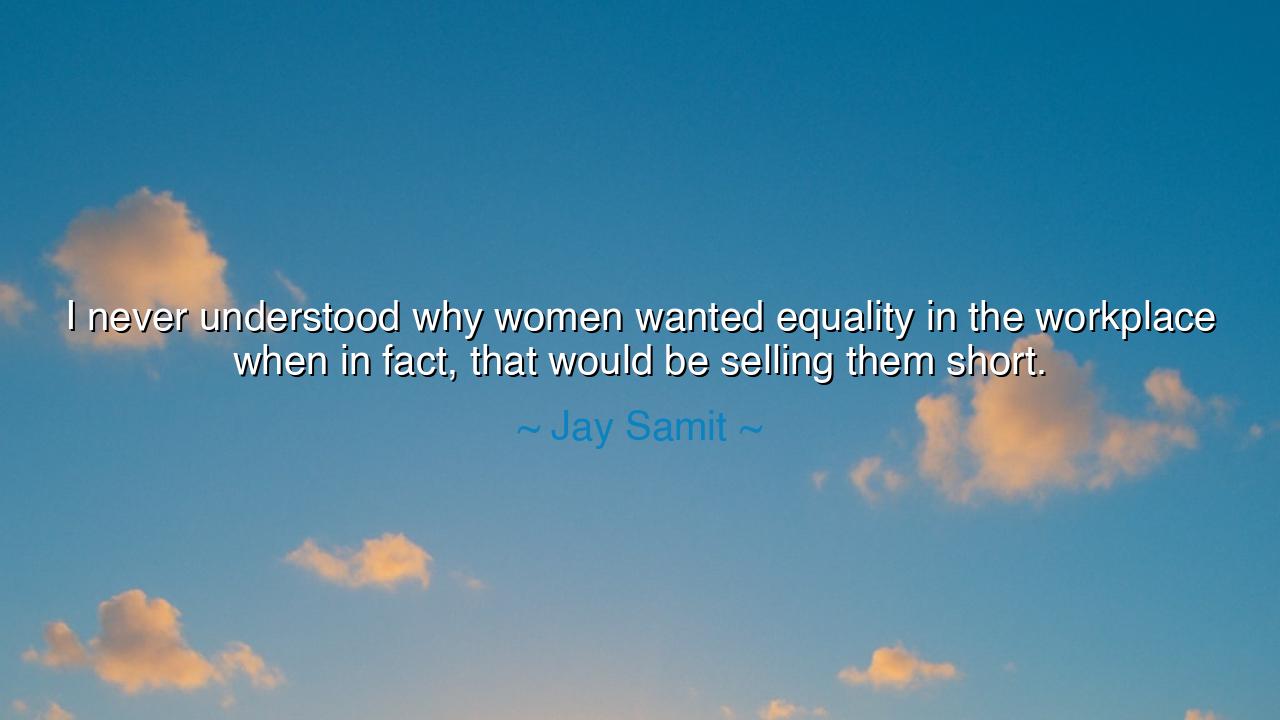
I never understood why women wanted equality in the workplace
I never understood why women wanted equality in the workplace when in fact, that would be selling them short.






In the words of Jay Samit, “I never understood why women wanted equality in the workplace when in fact, that would be selling them short.” These words, provocative in tone, are not meant to belittle the fight for equality, but to challenge the shallow way it is often understood. Samit suggests that women should not aspire merely to be treated as equals within systems already built on imbalance, but that their value surpasses the narrow definitions imposed by tradition. To accept only “equality” as measured by the structures of men, he argues, is to accept too little. It is to ask for a seat at a table, when in truth, women have the power to redesign the very house in which the table stands.
The ancients knew this truth in fragments. In the myths of Greece, goddesses like Athena and Artemis wielded wisdom and power beyond that of many men, yet mortal women were often bound to silence and submission. In Rome, women could not hold office, yet mothers and wives shaped emperors with their influence. These contradictions reveal the heart of Samit’s point: women’s worth was never truly less than men’s, but societies constructed hierarchies that measured value by narrow, masculine terms. To demand equality within such structures may secure fairness, but it does not yet recognize the fuller, immeasurable power women bring.
Consider the life of Marie Curie. She was not only “equal” to her male colleagues; she surpassed them, becoming the first person in history to win Nobel Prizes in two different sciences. Yet she struggled in a world reluctant to recognize her genius, a world that forced her to labor twice as hard for half the recognition. Her story proves Samit’s insight: to frame her success merely as equality would be to diminish it, to sell short her extraordinary contributions. Women like Curie do not only seek a fair place within the system—they redefine the boundaries of human possibility itself.
Samit’s words also point toward a flaw in how societies conceive of progress. Too often, the call for equality in the workplace means asking women to conform to the standards of men, to climb the same ladders, to play by the same rules. Yet what if those rules are flawed? What if the ladders themselves rest on broken ground? True empowerment is not simply to join the existing game, but to transform the game entirely—to create workplaces where compassion, collaboration, creativity, and resilience—qualities often overlooked—are recognized as the true foundations of success.
The deeper meaning of his words, then, is that women should not limit themselves by aspiring only to “sameness.” Equality is noble, but it must not be the final horizon. The ultimate vision is something greater: a society where every person, regardless of gender, can rise to their fullest potential, measured not by outdated hierarchies, but by the limitless possibilities of their contributions. To sell women short is to sell humanity short, for no civilization has ever reached greatness without honoring the full power of all its people.
The lesson for us is clear: equality must never mean erasure. Do not ask women to dim their light to fit into systems designed without them. Instead, honor their distinct strengths, voices, and perspectives as essential to progress. True justice lies not in imitation, but in transformation—not in women becoming “like men,” but in societies reshaping themselves to reflect the full power of humanity.
Practical actions follow from this wisdom. Challenge systems that define success only by masculine standards. Promote environments where women’s unique strengths are celebrated, not forced into conformity. Educate the next generation to value collaboration and compassion as much as competition. And above all, do not settle for equality alone—seek wholeness, seek transformation, seek a world in which no one’s worth is measured by comparison, but only by their true capacity to create, to lead, and to inspire.
Thus, Jay Samit’s words, though easily misunderstood, call us to a higher vision. They remind us that equality is not the ceiling, but the floor—the beginning of justice, not its end. To accept only equality is to accept less than women deserve, less than humanity itself is capable of. Let us then pass on this wisdom: never sell short the worth of half of humankind, but recognize in them the power to lead, to innovate, and to shape a future greater than any past.






AAdministratorAdministrator
Welcome, honored guests. Please leave a comment, we will respond soon